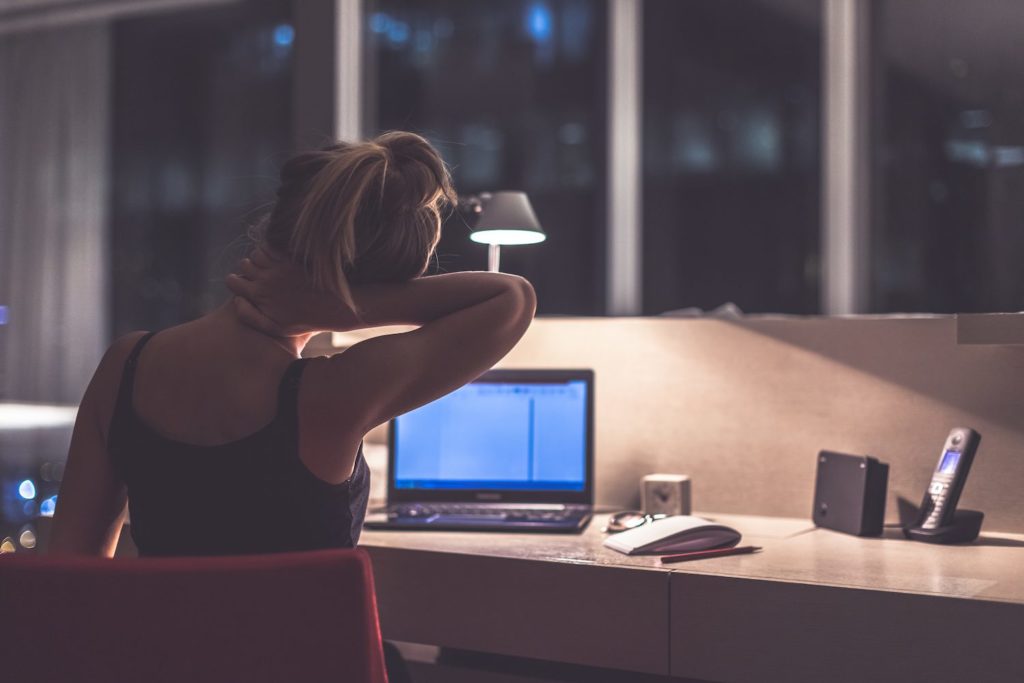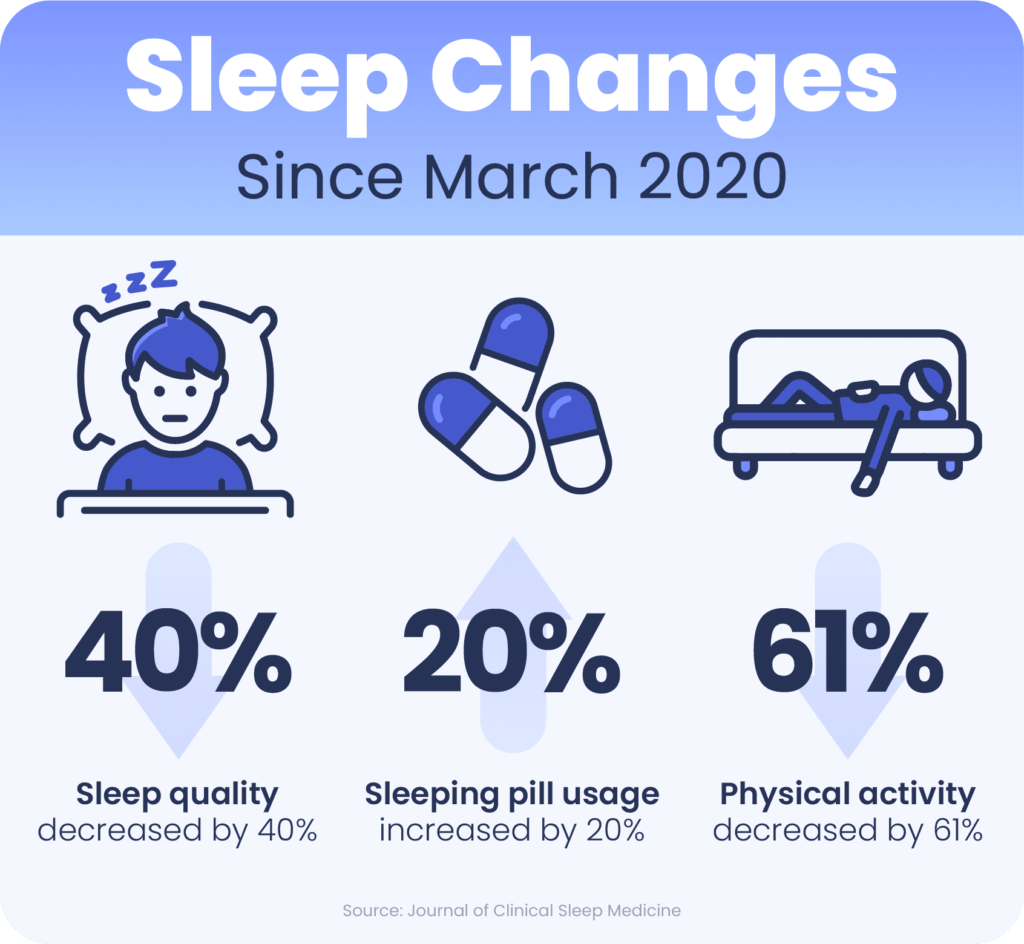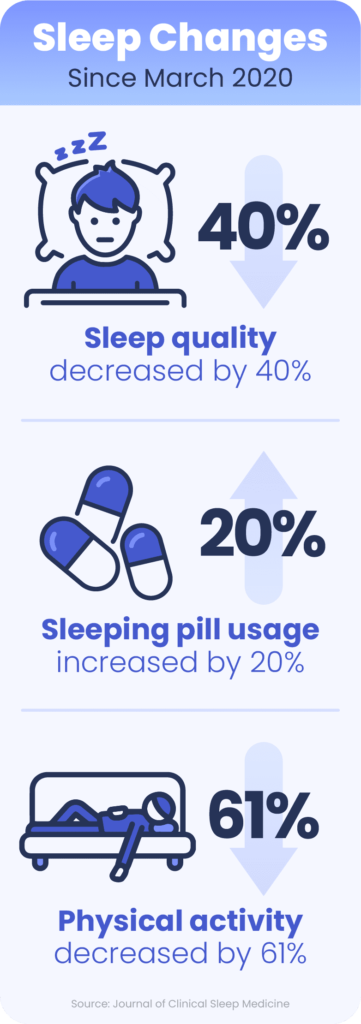Searching For Sleep Solutions When Working From Home

One of COVID-19’s lasting side effects is that when people work where they sleep, sleep often suffers. Work suffers, too.
The pandemic led to an increase in remote jobs, hybrid work, and work-from-home arrangements. While these options present flexibility that can be beneficial, they can also disrupt people’s sleep patterns and make it challenging to achieve work-life balance.
???? Got a hot tip? Pitch us your story idea, share your expertise with SleepFoundation.org, or let us know about your sleep experiences right here.
“People truly are having difficulty shutting their brains off,” says Dr. Melissa Milanak, a clinical psychologist who has heard her share of questions about remote work and sleep in the past two years.
Since the outset of the pandemic, employers have increasingly turned to the Medical University of South Carolina associate professor and her MIND Impact Consulting practice to help them and their employees unravel this paradox. Anywhere from 45% to 71% of full-time U.S. employees are working from home at least some of the time, up from 20% before the pandemic. At the same time, 40% of adults say they’ve been sleeping less and worse , even as they spend less time commuting, cavorting, and grooming. Sleeping-pill use increased 20%. Coronasomnia became a thing.
Dr. Milanak’s conference calls with companies are advice sessions: How do you make sense of this? It may start, she says, with a challenge that remote workers may not have considered about their jobs: “By the time it’s time to go to bed, our brains haven’t had that opportunity to really decompress.”
How Have Our Sleep Routines Changed?
Part of the issue is stress.
Pandemics don’t go down easily. There are the health parts. The world-freaking-out parts.
There’s also the part about our daily routines, which remote work first uprooted in 2020 and now regularly replants in various configurations of hybrid work environments and oft-changing schedules.
These changes can be positive and increase flexibility where we need it most. But a change in routine is often uncomfortable. Ask any dog owner how changing meal or walk times goes over.
Consistent and healthy sleep routines are part of good sleep hygiene, all of which can get us a good night’s rest.
When dining-room tables and bedroom corners first became makeshift offices, it triggered a departure from the sleep routines our bodies were used to, Dr. Milanak says.
“People felt more freedom,” Dr. Milanak says. “Because people didn’t have to physically go to work, later bedtimes became more common. But then they weren’t having the consistency of a regular bedtime.”
After the initial liberation of a work-from-home lifestyle, the thrill of late nights and binge-watching television seemed to fade. Suddenly having more lenient bedtimes “threw all of our systems out of whack,” Dr. Milanak says. “Now we could stay up as late as we wanted to and our bodies didn’t know when they should feel tired.”
In many ways, this change to our schedule stressed us out as much as a frantic work text.
“Sleep is a lot like a dog, not just because it is your friend, but also because it is highly trainable,” says Dr. Michael Grandner, director of the Sleep and Health Research Program at the University of Arizona.
The loosening of structure has seeped into the workplace itself, even when the workplace is less physical and more 24/7 than before. Catherine Mallette, director of editorial services at HarperCollins Publishers, noticed changes on her teams as the clock-in/clock-out culture disappeared.
“We are more likely to cancel meetings now if there is no agenda or if we can take care of something by email,” she says. “People tend to be quieter in video meetings.”
It could be sleep-related: One study notes that sleep-deprived people feel more lonely and less social around other people. Couple that with other factors such as Zoom fatigue and lack of physical interaction, and remote workers may long for the days of water-cooler conversation.
“We miss the camaraderie,” Mallette says.
Less Movement Makes Sleeping More Challenging
We may actually miss walking around.
Remote work, for many, means desks that are just a few steps from the bed — 16, to be exact, according to research from wellness company Upright Pose. According to Dr. Milanak, the physical activity baked into an office lifestyle plays a role in how tired we feel at the end of the day.
Without walking to and from meetings and lunches, or spending energy commuting, remote workers may have lost many of the days’ natural opportunities for movement and exercise.


“When we’re sitting all day, we’ll end the day feeling fatigued. But there’s a difference between sleepiness and fatigue,” Dr. Milanak says. “We might feel more mentally exhausted because we haven’t had those breaks. But we haven’t built up enough actual sleepiness to be able to fall asleep.”
One in three remote workers reported sitting for more than seven hours per day and walking fewer than 1,000 steps during work hours, according to Upright Pose’s research, quite a bit less than the recommended 10,000 daily steps.
Yeah, so we’re not getting our steps in. But in turn, we also may not be getting our rest in.
What Really Happens if You Don’t Use Those Sick Days
Sleep is “essential to the immune system,” Dr. Grandner says, and it allows our bodies to maintain the status quo. We learned at an early age to “rest up” when we were feeling ill.
Then a funny thing happened: We could work while sick.
No need to leave the bed when you had a laptop, a mute button, and all the stuff you needed to feel better at some point. Thus, no need to call in sick, if there was no one around to infect.
When we feel we have the ability to work while sick, we miss out on some pretty magical medicine: sleep.
Dr. Milanak says the pressure and expectations we feel at work create a conflict between our professional obligations and our need to rest. This may only be exacerbated for the estimated 50 million U.S. workers without paid sick leave .
“If you’re sick, but not terribly sick, society has already programmed us to work and push ourselves,” Dr. Milanak says. “That can actually prolong symptoms or illness in general because we’re not getting that extra rest that they need to heal.”
And feeling sick certainly isn’t going away. Approximately 8.8 million workers either had COVID-19 or were caring for someone who did during the initial weeks of 2022.
When we feel we have the ability to work while sick, we miss out on some pretty magical medicine: sleep.
While we sleep, our bodies produce T-cells, which play a critical role in our immune response to illness. Without that sleep, the body doesn’t have time to fight what ails us. We may be staying awake to answer those emails. But we’re not getting stronger.
“We make it just a little harder for our immune system to do its job,” Dr. Grandner says.
What’s Working About Remote Work?
Joshua Zelechoski’s job got a little easier in 2020.
The work was still there. But when the Washington, D.C.-area engineering project manager shifted to remote work, his 1.5 hours of commuting became a one-flight walk down basement steps to his home office. Eliminating that commute led to more time to make dinner, to spend with his family, and even to finish work tasks without the pressure to leave an office and avoid traffic.
It also led to more sleep.
“Optimistically, I used to get five or six hours on any given night,” Zelechoski says. He’s going to bed later now, he says. But he’s sleeping more.
It was the promise of remote work to begin with. Workers ideally had a bit more freedom to balance the professional and personal, to work wherever they’d like. To nap. It all caught on.
According to a survey by The New York Times and Morning Consult, 86% of remote workers in 2020 said they were satisfied working from home. One in three participants also reported a desire to quit their jobs altogether if remote work was no longer an option. Migration may also be a factor, with more than a quarter of surveyed remote workers stating they had relocated since the pandemic started.
Employers generally agreed, with 83% of respondents in a 2021 PwC survey saying working from home was a success for their business.
The daily grind that once demanded our time, money, and energy has, for some, created a space for supporting sleep health. Chandler Sterling, co-founder of Los Angeles-based culture and entertainment web site What’s Good, says the transition to remote work has changed his sleep for the better.
Sterling says the flexibility to stay up a bit later at night and sleep in an extra hour each day allows him to achieve “a schedule that works better for [his] body.”
How to Leave Work When You Work From Home
When Dr. Milanak educates employees and employers about getting in a world of remote work through her MIND Impact Consulting sessions, she talks about boundaries.
“For some [workers], it’s helping them set up a wind-down routine to help them to get more in that habit of relaxing so their body knows sleep is coming,” she says.
Although companies as large as Microsoft and Expedia began 2022 by unveiling their return-to-office plans, others have embraced a virtual-first approach to staffing and collaborating. Regardless of their approach, many employers are embracing a sleep focus similar to Dr. Milanak’s.
Some are implementing workplace sleep initiatives, building off efforts that started before the pandemic. Others are turning to third parties, such as the sleep “training camp” from sleep-tracker app Sleep Cycle that pairs sleep consultations with goal-setting and “sleep challenges.” The wellness app Calm also announced its retooling of its employer-focused services to expand sleep-related offerings.
It’s a signal that corporate America is latching onto the science that sleep makes us more productive, regardless of where we work. But signals don’t tuck you in at night.
“Our workplaces are not responsible for our health and well-being,” Dr. Grandner says. “We are.”
References
9 Sources
-
Wigert, B. L. S. A. B., PhD. (2022). Remote Work Persisting and Trending Permanent. Gallup.Com., Retrieved February 1, 2022.
https://news.gallup.com/poll/355907/remote-work-persisting-trending-permanent.aspx -
Parker, K., Horowitz, J. M., & Minkin, R. (2021). How the Coronavirus Outbreak Has – and Hasn’t – Changed the Way Americans Work. Pew Research Center’s Social & Demographic Trends Project., Retrieved January 20, 2022.
https://www.pewresearch.org/social-trends/2020/12/09/how-the-coronavirus-outbreak-has-and-hasnt-changed-the-way-americans-work/ -
Journal of Clinical Sleep Medicine. (2021). American Academy of Sleep Medicine Journals., Retrieved January 15, 2022.
https://jcsm.aasm.org/doi/10.5664/jcsm.8800 -
Simon, B. E. (2018). Sleep loss causes social withdrawal and loneliness. Nature., Retrieved February 5, 2022.
https://www.nature.com/articles/s41467-018-05377-0 -
The Health Dilemma of the Work from Home Era. (2021). Upright by DarioHealth., etrieved January 10, 2022.
https://www.uprightpose.com/the-health-dilemma-of-the-work-from-home-era/ -
Tudor-Locke, C., Craig, C. L., Brown, W. J., Clemes, S. A., De Cocker, K., Giles-Corti, B., Hatano, Y., Inoue, S., Matsudo, S. M., Mutrie, N., Oppert, J. M., Rowe, D. A., Schmidt, M. D., Schofield, G. M., Spence, J. C., Teixeira, P. J., Tully, M. A., & Blair, S. N. (2011). How many steps/day are enough? For adults. The international journal of behavioral nutrition and physical activity, 8, 79., Retrieved February 15, 2022.
https://www.ncbi.nlm.nih.gov/pmc/articles/PMC3197470/ -
The Effects of Sick Pay Mandates. (2020). NBER., Retrieved February 10, 2022.
https://www.nber.org/brd/effects-sick-pay-mandates -
US Census Bureau. (2022). Week 41 Household Pulse Survey: December 29, 2021 – January 10, 2022. Census.Gov., Retrieved January 11, 2022.
https://www.census.gov/data/tables/2021/demo/hhp/hhp41.html -
PricewaterhouseCoopers. (2021, January 12). Business needs a tighter strategy for remote work. PwC., Retrieved February 16, 2022
https://www.pwc.com/us/en/library/covid-19/us-remote-work-survey.html












































































